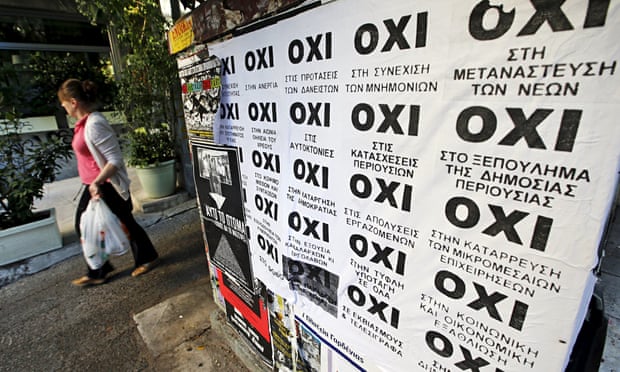| Online: | |
| Visits: | |
| Stories: |
Greek Referendum EXPLAINED! Yes Or No Bail-ins & Hair Cuts All Round!

In most cases referendum questions are fairly simple, as are the solutions. You are handed a straightforward proposal, vote Yes or No and then the matter is resolved.
The major issue with the Greek referendum is that neither the question nor the answer are easy in the merest.
Let us begin with the question itself. The ballot documents which Greeks will have to say No or Yes to (the order is determined by the government, which desires a no vote) consist of an extraordinarily lengthy question.
The abridged version of it goes as follows: “Do you agree with the bailout terms we were handed in Brussels on June 25?”
But even this is more complex than at first it looks: the bailout terms were extraordinarily long and abstruse, with ten sections, each with multiple sub-sections and clauses, all in tricky economese.
Even supposing every Greek citizen would read and understand these terms (and understand most economists I have spoken to have not) there is another larger problem: the bailout proposal itself is no longer legitimate, having been taken off the table and substituted with a new one a few days later.

Even that updated offer is no longer out there since the bailout ended last Tuesday.
In the case of a Yes vote, it’s not yet determined that the old bailout could be exhumed. Actually, the other European finance ministers have stated that now it’s out of date Greece would have to look for a whole new, third bailout. That would take even more time to decide.
Nor are there notably clear answers about what would transpire in the event of a No vote. Some point out it would mean Greece would have to abandon the euro. Others (chiefly the Greek government) claim that this is hardly guaranteed. Regardless, it’s not clear that departing the euro would solve all of Greece’s issues.
The straightforward economist’s reasoning is that it would be good news for the country since the new drachma would fall in value (perhaps as much as halving against the euro) which would make Greek goods less expensive overseas.
The issue is that Greece’s economy certainly is not particularly concentrated on exports, which account for only 33% of GDP – one of the lowest levels in Europe.
Additionally, even if Greece left the euro and efficiently managed to default on its debt (which it would never accomplish since it would be attacked for as many pennies as they can in the courts) it still would not have sufficient money to run its economy.
That certainly is what economists suggest when they talk about the country having a “primary deficit” – a shortfall of tax revenues to pay for its state, even after debt interest payments are disregarded.
Ok, enough fooling, the likelihood is that Greece would have to write off some of its debt no matter if it votes Yes or No.
As has been exposed on Tuesday, the IMF posted a paper just before Athens called the referendum quarrelling that a major chunk (possibly over €50bn) should be written off.
That document, which was later posted, has triggered an almighty stir.
Nonetheless it is another tip that no matter if there is a yes or a no this weekend, there will still continue to be many more questions than answers in Greece.
YOU HAD BEST OBSERVE CAREFULLY AS THE DEVELOPMENTS HAPPEN IN GREECE, FOR SOMEDAY REALLY QUICKLY, THIS WILL BE VISITING THIS COUNTRY AS WELL!




Source: http://fusionlacedillusions.com/2015/07/05/greek-referendum-explained-yes-or-no-bail-ins-hair-cuts-all-round/




